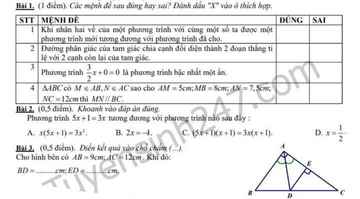
Hãy nhập câu hỏi của bạn vào đây, nếu là tài khoản VIP, bạn sẽ được ưu tiên trả lời.


1: \(100-x^2=\left(10-x\right)\left(10+x\right)\)
2: \(b^2-a^2=\left(b-a\right)\left(b+a\right)\)
3: \(\left(3y\right)^2-\left(4x\right)^2=\left(3y-4x\right)\left(3y+4x\right)\)


\(-2xy\left(4xy+9x^2+4y\right)=-2xy.4xy+\left(-2xy\right).9x^2+\left(-2xy\right).4y\)
\(=-8x^2y^2-18x^3y-8xy^2\)
\(x\left(x+8y\right)-y\left(8x-y^2\right)=x^2+8xy-8xy+y^3\)
\(=x^2+y^3\)

\(\dfrac{4x+2}{4x-2}+\dfrac{3-6x}{6x-6}\left(dkxd:x\ne\dfrac{1}{2};x\ne1\right)\)
\(=\dfrac{2\left(2x+1\right)}{2\left(2x-1\right)}+\dfrac{3\left(1-2x\right)}{6\left(x-1\right)}\)
\(=\dfrac{2x+1}{2x-1}+\dfrac{1-2x}{2\left(x-1\right)}\)
\(=\dfrac{2x+1}{2x-1}+\dfrac{1-2x}{2x-2}\)
\(=\dfrac{\left(2x+1\right)\left(2x-2\right)}{\left(2x-1\right)\left(2x-2\right)}+\dfrac{\left(1-2x\right)\left(2x-1\right)}{\left(2x-1\right)\left(2x-2\right)}\)
\(=\dfrac{4x^2-2x-2}{\left(2x-1\right)\left(2x-2\right)}+\dfrac{-4x^2+4x-1}{\left(2x-1\right)\left(2x-2\right)}\)
\(=\dfrac{4x^2-2x-2-4x^2+4x-1}{\left(2x-1\right)\left(2x-2\right)}\)
\(=\dfrac{2x-3}{\left(2x-1\right)\left(2x-2\right)}\)
\(=\dfrac{2x-3}{4x^2-6x+2}\)

a): ta có AB^2 + AC^2 = 30^2 = 900 <=> AB = √(900 - AC^2)
AB:AC = 3:4 <=> AB = 3 * AC / 4
=> √(900 - AC^2) = 3 * AC / 4
<=> 900 - AC^2 = 9 * AC^2 / 16
<=> 14400 - 16 * AC^2 = 9 * AC^2
<=> 14400 = 25 * AC^2
<=> 576 = AC^2
<=> AC = 24
=> AB = 24 / 4 * 3 = 18

\(\dfrac{x+2}{x-3}< 0\)vì \(x+2>x-3\)
\(\left\{{}\begin{matrix}x+2>0\\x-3< 0\end{matrix}\right.\Leftrightarrow\left\{{}\begin{matrix}x>-2\\x< 3\end{matrix}\right.\)<=> -2 < x < 3

a: Xét tứ giác ABDC có
N là trung điểm của BC
N là trung điểm của AD
Do đó: ABDC là hình bình hành
mà \(\widehat{BAC}=90^0\)
nên ABDC là hình chữ nhật

Áp dụng định lý Bê-du, số dư của x100 cho x+1 = x- (-1) là (-1)100=1
Vậy ....







a: \(=\dfrac{5xy-4y+3xy+4y}{2x^2y^3}=\dfrac{8xy}{2x^2y^3}=\dfrac{4}{xy^2}\)
b: \(=\dfrac{\left(x^2-1\right)\left(x^2+1\right)-2x\left(x^2-1\right)}{x^2-1}=x^2-2x+1\)
c: \(=\dfrac{3x-x+6}{x\left(2x+6\right)}=\dfrac{2x+6}{x\left(2x+6\right)}=\dfrac{1}{x}\)